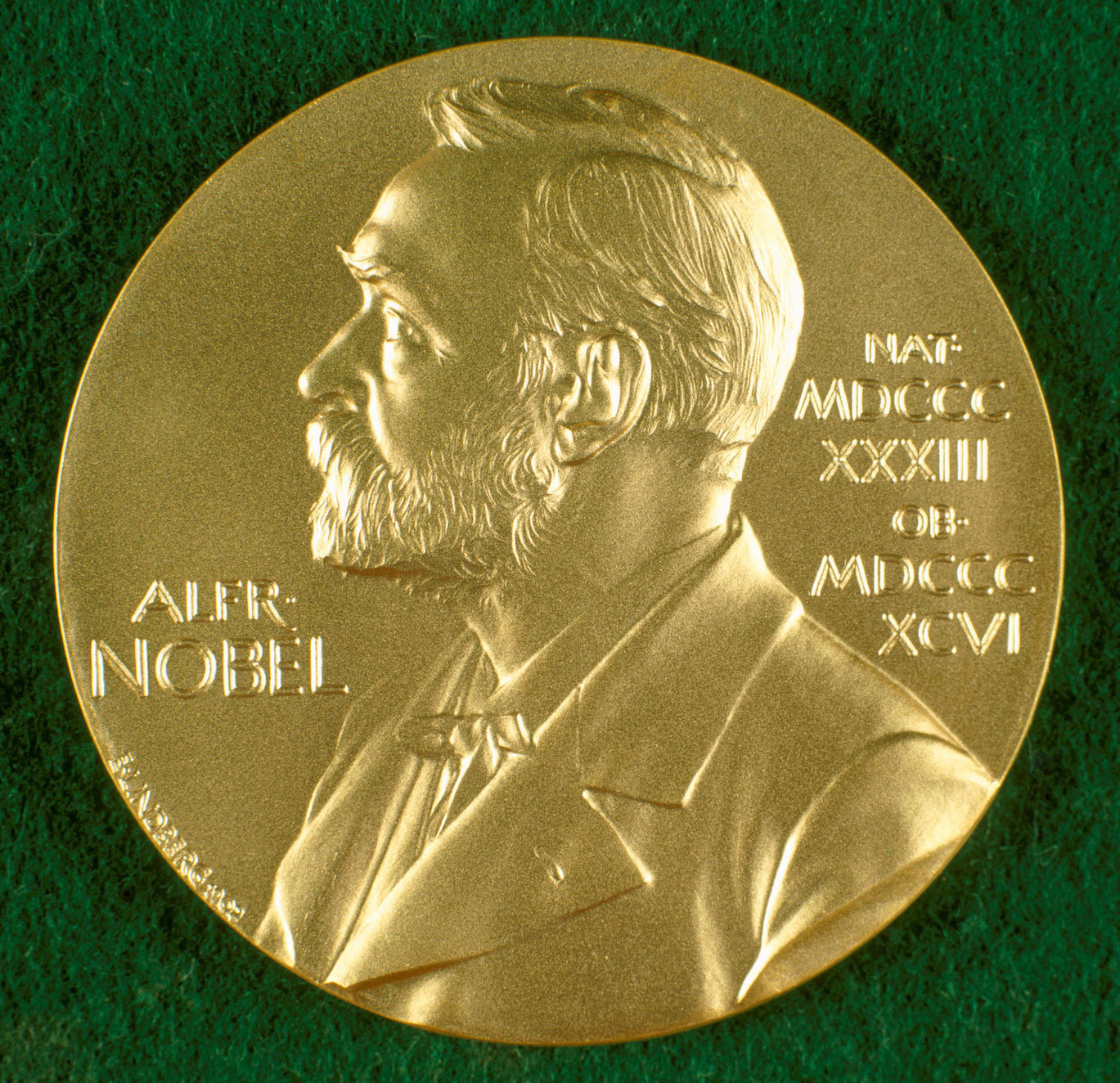
The Nobel Prize is a lot of yearly global honours offered in a few classifications by Swedish and Norwegian organizations in acknowledgement of scholarly, social, or logical advances. The desire of the Swedish scientist, designer and industrialist Alfred Nobel built up the five Nobel prizes in 1895. The prizes in Chemistry, Literature, Peace, Physics, and Physiology or Medicine were first granted in 1901. The prizes are broadly viewed as the most renowned honours accessible in their individual fields.
In 1968, Sweden's national bank Sveriges Riksbank set up the Sveriges Riksbank Prize in Economic Sciences in Memory of Alfred Nobel. The honour depends on a gift got by the Nobel Foundation in 1968 from Sveriges Riksbank on the event of the bank's 300th commemoration. The first Prize in Quite a while was granted to Ragnar Frisch and Jan Tinbergen in 1969. The Prize in Economic Sciences is granted by the Royal Swedish Academy of Sciences, Stockholm, Sweden, as per indistinguishable standards from for the Nobel Prizes that have been granted since 1901.
The Royal Swedish Academy of Sciences grants the Nobel Prize in Chemistry, the Nobel Prize in Physics, and the Sveriges Riksbank Prize in Economic Sciences in Memory of Alfred Nobel; the Nobel Assembly at the Karolinska Institute grants the Nobel Prize in Physiology or Medicine; the Swedish Academy gives the Nobel Prize in Literature; and the Norwegian Nobel Committee grants the Nobel Peace Prize.
Somewhere in the range of 1901 and 2018, the Nobel Prizes (and the Prizes in Economic Sciences, from 1969 on) were granted multiple times to 935 individuals and associations. With some getting the Nobel Prize more than once, this makes a sum of 27 associations and 908 people. The prize services occur yearly in Stockholm, Sweden (except for the Peace Prize function, which is held in Oslo, Norway).
Every beneficiary (known as a "laureate") gets a gold award, a recognition, and a whole of cash that has been chosen by the Nobel Foundation. (Starting at 2017, each prize is worth 9,000,000 SEK, or about US$1,110,000, €944,000, or £836,000). Awards made before 1980 were struck in 23-carat gold, and later in 18-carat green gold plated with a 24-carat gold covering.
First prizes
Wilhelm Röntgen got the main Physics Prize for his revelation of X-beams.
When the Nobel Foundation and its rules were set up, the Nobel Committees started gathering assignments for the debut prizes. Along these lines, they sent a rundown of starter possibility to the prize-granting establishments.
The Nobel Committee's Physics Prize waitlist referred to Wilhelm Röntgen's disclosure of X-beams and Philipp Lenard's work on cathode beams. The Academy of Sciences chose Röntgen for the prize. In the most recent many years of the nineteenth century, numerous scientific experts had made noteworthy commitments. Hence, with the Chemistry Prize, the Academy "was primarily looked with only choosing the request where these researchers ought to be granted the prize". The Academy got 20 selections, eleven of them for Jacobus van 't Hoff. Van 't Hoff was granted the prize for his commitments in substance thermodynamics.
The Swedish Academy picked the writer Sully Prudhomme for the primary Nobel Prize in Literature. A gathering including 42 Swedish essayists, specialists, and scholarly pundits challenged this choice, having anticipated that Leo Tolstoy should be granted. A few, including Burton Feldman, have censured this prize since they consider Prudhomme an unremarkable artist. Feldman's clarification is that the greater part of the Academy individuals favoured Victorian writing and along these lines chosen a Victorian writer. The main Physiology or Medicine Prize went to the German physiologist and microbiologist Emil von Behring. During the 1890s, von Behring built up an antibody to treat diphtheria, which up to that point was causing a great many passing every year.
The primary Nobel Peace Prize went to the Swiss Jean Henri Dunant for his job in establishing the International Red Cross Movement and starting the Geneva Convention, and mutually given to French radical Frédéric Passy, organizer of the Peace League and dynamic with Dunant in the Alliance for Order and Civilization.
2019 WINNERS
The 2019 Nobel Prize declarations are in progress this week, with the primary prize, in the classification of physiology or drug, setting off to a trio of researchers for their work on cells' capacity to detect and respond to oxygen accessibility.
The Nobel Prize in material science, science and writing have been reported and the prizes in harmony and monetary sciences will pursue throughout the following couple of days. The honours are an acknowledgement of work that advances every one of the separate fields. Nobel victors are given a decoration, authentication and a money grant of about $900,000 (when numerous individuals win a solitary Nobel, they normally split the money grant.)
Here are the 2019 Nobel Prize victors (up until now):
2019 Nobel Prize in Physiology or Medicine
William G. Kaelin Jr., Sir Peter J. Ratcliffe and Gregg L. Semenza won the 2019 Nobel Prize in physiology or prescription. The trio "recognized atomic apparatus that manages the action of qualities because of shifting degrees of oxygen," as indicated by The Nobel Assembly. Their work, says the Assembly, has "made ready for promising new methodologies to battle sickliness, malignancy and numerous different illnesses."
2019 Nobel Prize in Physics
James Peebles, Michel Mayor and Didier Queloz won the 2019 Nobel Prize in material science. Peebles, of Princeton University, got half of the honour, per the Nobel Assembly, for work concentrated on "hypothetical revelations in physical cosmology," while Mayor and Queloz, of the University of Geneva (and, for Queloz, Cambridge University) shared a large portion of the honour "for the disclosure of an exoplanet circling a sunlight-based sort star."
"The current year's Laureates have changed our thoughts regarding the universe," the Assembly wrote in a discharge going with the Prize's declaration. "While James Peebles' hypothetical revelations added to our comprehension of how the universe advanced after the Big Bang, Michel Mayor and Didier Queloz investigated our grandiose neighbourhoods on the chase for obscure planets. Their revelations have perpetually changed our originations of the world."
2019 Nobel Prize in Chemistry
John B. Goodenough, M. Stanley Whittingham and Akira Yoshino won the 2019 Nobel Prize in science. The three researchers have all attempted to create and propel lithium-particle batteries, presently pervasive innovation which the Nobel Assembly said has "established the framework of a remote, petroleum product free society."
2019 Nobel Prize in Literature
Austrian writer and dramatist Peter Handke won the 2019 Nobel Prize in writing "for a compelling work that with phonetic inventiveness has investigated the outskirts and the explicitness of human experience," as indicated by the Nobel Assembly. Clean creator Olga Tokarczuk won the 2018 Nobel Prize in writing "for an account creative mind that with comprehensive energy speaks to the intersection of limits as a type of life," the Assembly said. The two honours were both allowed out this year since a year ago declaration was dropped amidst rape charges.
2019 Nobel Peace Prize
The 2019 Nobel Peace Prize has been granted to Ethiopian Prime Minister Abiy Ahmed for his work to finish a long-running outskirt question between his nation and neighbouring Eritrea. The Norwegian Nobel Committee likewise referred to Abiy's interior changes.
"It was Abiy who kicked off the harmony procedure on June 2018, only three months in the wake of getting down to business," composes TIME's Aryn Baker. "In an unexpected move, he said he would hand a contested border town over to Eritrea, as per the provisions of a since quite a while ago ignored harmony understanding from 2000. Half a month later Abiy and Eritrean President Isaias Afwerki announced a conclusion to the war between the two nations."
Atmosphere lobbyist Greta Thunberg was a most loved to win the 2019 Nobel Peace Prize.
2019 Prize in Economic Sciences
A trio of financial specialists, Abhijit Banerjee, Esther Duflo and Michael Kremer, got the 2019 Nobel Prize in Economic Sciences "for their exploratory way to deal with easing worldwide destitution."
"The current year's Laureates have acquainted another methodology with getting dependable answers about the most ideal approaches to battle worldwide destitution," peruses an announcement from The Royal Swedish Academy of Sciences. "In short, it includes partitioning this issue into littler, increasingly reasonable, questions — for instance, the best mediations for improving instructive results or kid wellbeing. They have demonstrated that these littler, increasingly exact, questions are regularly best addressed by means of painstakingly planned examinations among the individuals who are generally influenced."
Duflo, a 46-year-old educator at the Massachusetts Institute of Technology, is the most youthful individual to win the financial matters prize, the Associated Press reports. She's additionally just the second-since forever lady to get the prize.

